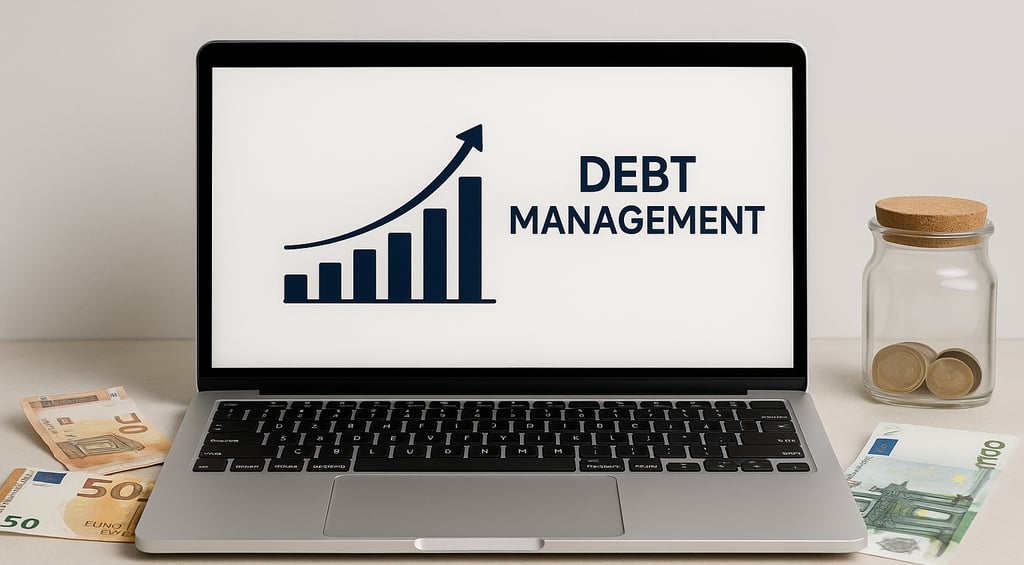Tips for Managing Debt Responsibly
Is debt keeping you up at night? Start here. I’ll guide you step by step on how to manage it wisely—without falling into traps or extreme solutions.
DEBT REDUCTION STRATEGIES
Dott. Solver
5/9/20256 min read


Understanding Debt
Debt is a financial condition that occurs when an individual or entity borrows money from another person or institution with the commitment to repay it, often with added interest. Debt is typically categorized as either good debt or bad debt.
Good debt is used for productive investments, such as a mortgage for buying a home or a loan to finance education. These types of debt can generate greater economic returns compared to their associated costs.
On the other hand, bad debt refers to loans that do not provide any real benefit, such as credit card debt accumulated from unnecessary purchases.
There are various forms of debt, each with distinct characteristics. Personal loans, for example, are money borrowed for different purposes, such as consolidating other debts, and usually come with high interest rates. Credit cards offer immediate flexibility, but with high interest rates if not paid off on time. Mortgages, commonly used to purchase property, typically come with lower interest rates and longer repayment terms, but also carry significant financial responsibility for the borrower.
Many people face financial hardship due to poor debt management. Unexpected expenses — like car repairs or medical emergencies — can lead individuals or families to rely on loans or credit cards.
Moreover, the lack of awareness or planning can limit one’s financial options over time.
Understanding the different types of debt and their impact on financial health is essential for effective personal finance management. It helps individuals avoid over-indebtedness and plan more wisely for their financial future.
Analyzing Your Financial Situation
To manage debt responsibly, it is essential to have a clear understanding of your financial situation.
The first step in this process is to conduct an accurate analysis of your income, expenses, and debts.
This involves gathering detailed information about your finances.
Starting with a complete overview of your monthly income—including salaries, side hustles, and any other sources—is key.
Once your income is clearly identified, the next step is to categorize monthly expenses into necessities (such as rent, food, transportation) and discretionary spending (like entertainment, travel).
Once this data is collected, it becomes useful to create a financial planner.
Modern tools such as spreadsheets or specialized apps for personal finance management can simplify this task.
These tools allow you to visualize your income and expenses clearly, making it easier to track and evaluate your spending habits.
For example, using a spreadsheet allows you to generate charts that illustrate the ratio of spending to income, highlighting potential areas where cuts can be made.
In addition, it is important to analyze your outstanding debts.
Creating a list of debts—organized by amount and interest rate—helps determine which ones to prioritize.
This in-depth assessment of your financial situation is a crucial step in the debt management process, as it lays the foundation for planning repayment strategies and making more informed financial decisions.
Creating a Debt Repayment Plan
Creating a debt repayment plan is a crucial step toward managing your finances responsibly.
A well-structured approach not only helps you repay debts faster, but also gives you greater clarity about your progress.
There are several strategies to develop an effective repayment plan, including the avalanche method and the snowball method.
These approaches can be tailored based on the individual’s situation and the type of debt involved.
The avalanche method prioritizes paying off debts with the highest interest rates first.
Starting with high-interest debt can save money in the long term by reducing the total amount of interest paid.
Once the first debt is paid off, the payment is redirected toward the next-highest interest debt, and so on, until all debts are cleared.
On the other hand, the snowball method focuses on repaying the smallest debts first.
This approach is especially effective for those who need quick motivation.
As each small debt is paid off, the freed-up money is rolled into the next smallest debt, creating a psychological boost and a growing sense of momentum.
This method works well for people who benefit from visible, fast wins when tackling their financial goals.
Setting repayment priorities helps define which debts to tackle first by evaluating interest rates, balances, and consequences.
Maintaining motivation throughout the process is also essential—setting short- and mid-term goals and celebrating milestones along the way can make a big difference.
A well-structured debt repayment plan can turn what feels like an overwhelming burden into a clear, empowering journey toward financial stability.
Avoiding Additional Debt Accumulation
Managing debt is a demanding task, but the first step toward effective recovery is to avoid accumulating further debt.
Careful planning of daily expenses is essential for maintaining financial stability.
Creating an accurate budget provides a clear view of monthly income and expenses.
Setting spending limits for essential categories—such as food, utilities, and housing—helps prevent impulsive purchases that could increase debt levels.
It’s important to live within your means, as trying to maintain a lifestyle beyond your financial capacity is one of the most common causes of over-indebtedness.
A responsible approach is to choose mindful and moderate consumption, distinguishing between needs and wants.
During the repayment process, unnecessary purchases should be minimized.
Temptations like promotional sales and easy credit offers can seem appealing; being aware of these situations is crucial for staying in control of your financial health.
To avoid accumulating more debt, an effective strategy is to use payment methods aligned with your real financial capacity.
Choosing cash payments over credit cards can reduce the risk of overspending and falling deeper into debt.
Adopting a disciplined approach to personal finance—such as including an emergency fund—can also provide greater peace of mind.
Ultimately, mindful spending and careful budgeting are key elements in avoiding new debt while following a repayment plan.
Consulting Industry Professionals
Managing debt responsibly can be a complex and stressful task, especially for those in a precarious financial situation.
In such cases, it is often helpful to consult industry professionals, such as financial experts or debt advisors, who can provide guidance and support.
There are many advantages to seeking help from professionals.
First, they possess in-depth knowledge of debt dynamics and can help create a personalized repayment plan tailored to the individual's specific needs and financial capacity.
Moreover, professionals can offer practical advice on how to improve daily financial management and optimize income, while suggesting strategies to reduce expenses and improve spending habits.
Expert advice can also protect individuals from scams or unreliable offers that may appear in the debt relief market.
Many certified professionals operate within regulated organizations, which helps ensure high service standards and trustworthy support.
Lastly, it’s important to mention the role of nonprofit organizations in supporting individuals facing financial hardship.
These organizations can offer free or low-cost counseling programs, assisting people in developing a debt management plan that helps them get back on the path to financial stability.
Collaborating with professionals and nonprofit organizations, therefore, represents a valid and responsible solution for addressing debt-related issues, contributing to a more secure financial future.
Ongoing Financial Education
Continuous financial education plays a crucial role in responsible debt management.
Investing time and resources in improving personal finance skills can have a significant impact on the ability to make informed financial decisions.
Given the rapid changes in today’s economic landscape, staying updated on emerging financial practices and industry trends is more important than ever.
An effective way to expand financial knowledge is through reading books.
Many publications cover topics like debt management, saving, and investing.
Well-known personal finance authors—such as Dave Ramsey and Suze Orman—provide valuable advice and strategies for navigating financial challenges.
Additionally, there are countless blogs and articles that offer fresh and useful content across various aspects of personal finance.
Online courses are another excellent resource for financial education.
Platforms like Coursera, Udemy, and edX offer courses on personal finance and debt management, helping users improve their understanding of economic dynamics and management strategies.
Attending live workshops or seminars hosted by industry experts can also enhance interactive learning and promote networking with others who share similar financial goals.
Staying informed about financial news is essential.
Subscribing to financial newsletters, following finance-themed podcasts, and participating in industry events allow individuals to gain broader perspectives and better adapt to market changes.
In summary, ongoing financial education is crucial for anyone who wants to manage debt responsibly, providing the skills needed to tackle today’s and tomorrow’s financial challenges.
Testimonials and Success Stories
The stories of those who have faced and overcome debt can serve not only as inspiration but also as practical guidance for anyone currently facing financial difficulties.
These stories not only highlight personal journeys of improvement, but also showcase concrete strategies for managing debt responsibly.
One of the most meaningful stories is that of Laura, a professional who had accumulated significant debt due to impulsive spending and poor credit card management.
Laura began taking control of her situation by attending financial education seminars.
She learned how to create a budget and developed a debt repayment plan.
Through determination and commitment, she managed to repay her debts over a period of three years, transforming her financial life.
Her motivation stemmed from the desire to provide a better future for her family.
Another inspiring story is that of Marco, who, after suddenly losing his job, had to face unexpected challenges.
Instead of giving up, he contacted a financial advisor for support.
Marco analyzed his spending and learned to set financial priorities.
He also explored opportunities for secondary work to increase his income.
With perseverance and strategy, he managed to regain financial stability and is now working on building an emergency fund to avoid future debt problems.
These stories show how resilience, combined with a strategic approach, can lead to more responsible debt management.
Every experience is unique, but the dedication and commitment to improving one’s financial situation are common traits among those who overcome difficulties and achieve success in managing debt.
Inspiration
Personal and financial growth for all.
Opportunities
Contact
info@dottsolver.com
© 2025 Dott. Solver – Brand of Sirio di Carmine Durante
VAT ID: 06358230651 | All rights reserved
